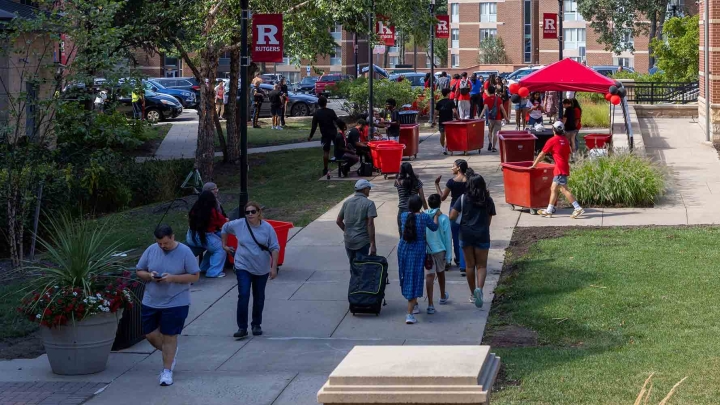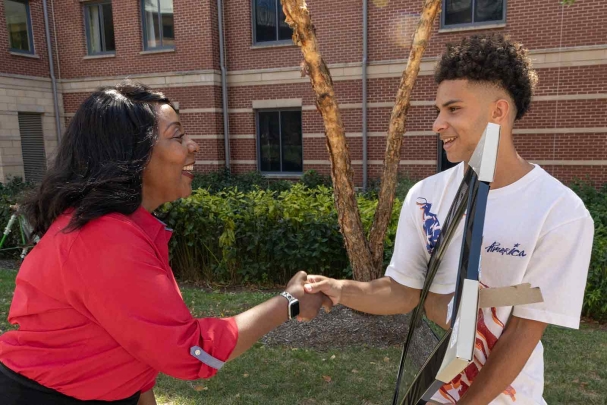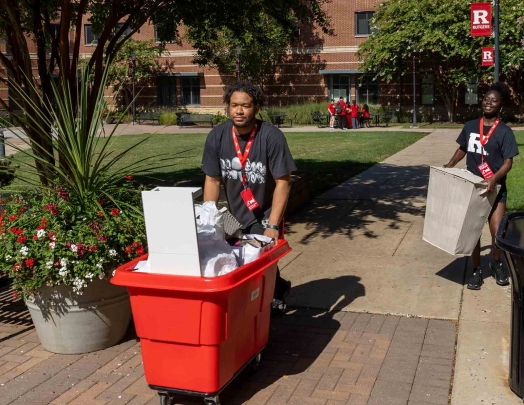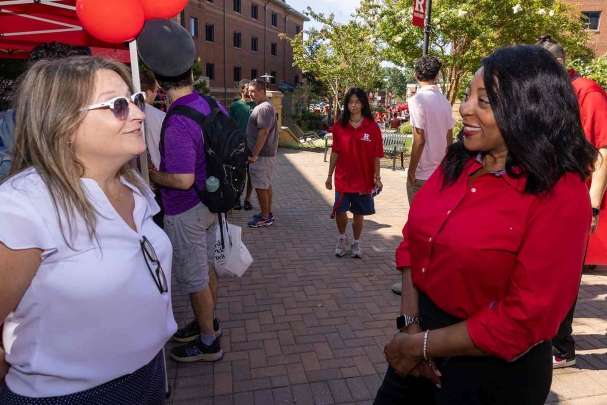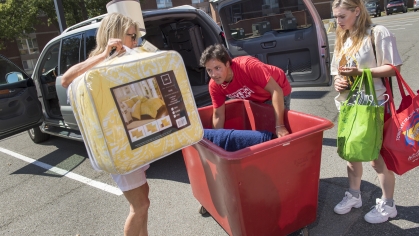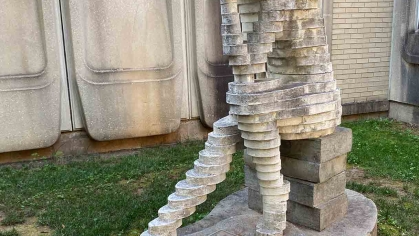At Busch, First-Year Students Studying Science, Tech and Medicine Have a Neighborhood of Support
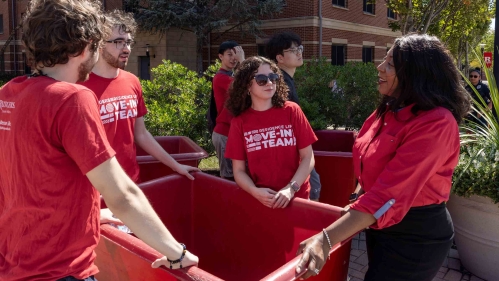
Rutgers-New Brunswick launches a living-learning pilot program embedding and aligning academic, residential and developmental services
There are a lot of experiments taking place on Busch campus, the hub of science, engineering, technology and health care at Rutgers University-New Brunswick.
This semester, the Discovery Advantage First-Year Neighborhood housed within the Busch Engineering Science and Technology (BEST) Hall will be among them.
We are committed to our students’ success, and initiatives like Discovery Neighborhood focus on intellectual growth as well as personal development.
Francine Conway
Chancellor of Rutgers-New Brunswick
University officials describe the pilot program as a living-learning community for first-year students that embeds and aligns academic, residential and developmental support services into a coordinated, student-centered environment.
“We are committed to our students’ success, and initiatives like Discovery Neighborhood focus on intellectual growth as well as personal development, ensuring our first-year students find a home, a community, and the support they need to thrive within Rutgers’ world-class academic culture,” said Rutgers-New Brunswick Chancellor Francine Conway.
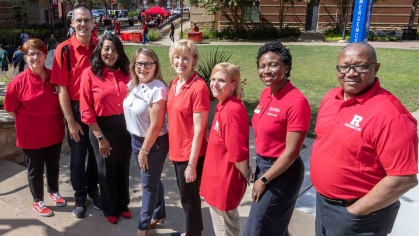
Called the Discovery Neighborhood for short, this experiential learning community will serve two cohorts of first-year college students attending the School of Arts and Sciences, the School of Engineering, the School of Environmental and Biological Sciences, the Ernest Mario School of Pharmacy or the School of Nursing:
About 140 students looking to pursue a pre-medical education track or are interested in a health profession
Roughly 350 students interested in the science, technology, engineering and math (STEM) fields
Administrators said the Discovery Neighborhood will provide each cohort with differentiated yet overlapping experiences with shared learning goals, outcomes and opportunities.
“We're embedding supports and programs to really help our first-year students have the best living environment they possibly could,” said Anne Newman, senior associate vice chancellor for the Rutgers-New Brunswick Division of Student Affairs and dean of students.
The main goals of the Discovery Neighborhood are to help students find community and a sense of belonging and to connect them to support services such as counseling and tutoring, with the idea that achieving those targets also will promote academic success.
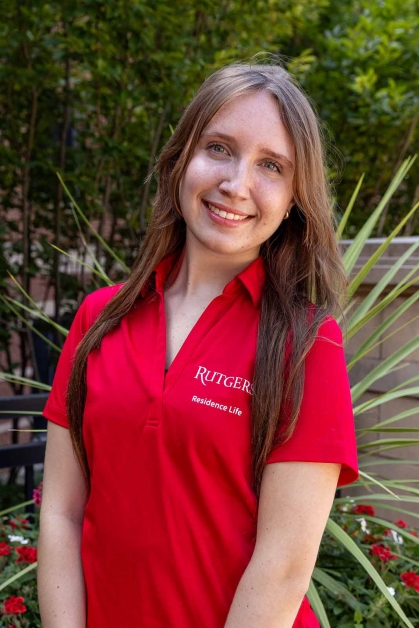
First-year students at large public universities often face hidden challenges navigating systems, such as registration or student accounting, to build community and pursue success – often without clear support structures, university officials noted.
The Discovery Neighborhood addresses these issues with a learning community that connects students directly – and proactively – with people, programs and resources.
“I think at such a large institution, you hear a lot of ‘I didn't know,’” said Ariel Leget, associate director for residence education. “So, we want to ensure that those resources are being reiterated.”
“There are so many challenges that a lot of times first-year students get lost, and they don't have those opportunities to have that small school experience,” said Newman. “We wanted to make sure that we were doing all we could when it comes to retention of our first-year students.”
Newman added that the Discovery Neighborhood aims to help students create connections with their peers and to resources.
Leget said staff and peer mentors called community navigators – undergraduate student leaders (sophomores and above) who will bring their own STEM identities to their roles as peer advisers – will be on hand to create a culture of embedded support, reducing the burden on students to seek assistance.
“They're really focusing on transitioning these first-year students to Rutgers by making them aware of resources and helping build community,” Leget said.
One community navigator, Julia Sierzputowski, said she wished the Discovery Neighborhood existed when she was a first-year student.
There are so many challenges that a lot of times first-year students get lost, and they don't have those opportunities to have that small school experience. We wanted to make sure that we were doing all we could when it comes to retention of our first-year students.
Anne Newman
Senior associate vice chancellor for the Rutgers-New Brunswick Division of Student Affairs and dean of students
“I really do think that having a set of individuals in residence particularly oriented and trained toward the academic and personal professional development of students would have been so helpful when I was a freshman,” said Sierzputowski, a senior attending the Ernest Mario School of Pharmacy and a student researcher at the laboratory of Professor Andrew Gow focused on pulmonary sciences. “Because when you come in, you don't know where to start. There are just so many things that are thrown at you, and it's so hard to navigate all those resources yourself – what's truly worth it and what's not for a student to construct and achieve their goals.”
Sierzputowski, 22, of Kearny, N.J., said the Discovery Neighborhood will be “a great way for students to build community amongst each other,” adding that it “provides the perfect opportunity for individuals to build upon their academic and professional desires.”
Students living in the Discovery Neighborhood will learn:
Independent living and life skills such as financial responsibility, interpersonal communication and self-sufficiency
Opportunities to explore career paths (including how to use the university’s online recruiting platform) and prepare for life after graduation
Academic resources, such as training on how to effectively use campus resources, including academic advising, to support learning, plan courses and understand requirements
Civic engagement and leadership opportunities (i.e., student leader positions in the residence hall association)
Community engagement, including building support networks to enhance a sense of belonging
The pilot project stems from a student success initiative developed through the Rutgers-New Brunswick Academic Master Plan with input from nearly 200 faculty, staff and students.
University officials overseeing the program will measure the success of the Discovery Neighborhood by tracking:
Student engagement with support services
Student satisfaction and sense of belonging
First-year retention and grade point average
Neal Buccino contributed to this article.

